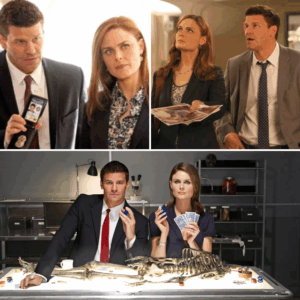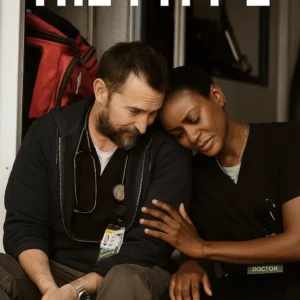Since its premiere on April 15, 2025, Netflix’s The Glass Dome has gripped audiences worldwide with its chilling narrative and atmospheric tension, cementing its place as a standout in the Nordic noir genre. Crafted by Swedish crime-writing sensation Camilla Läckberg, this six-episode series delivers a psychological thriller that promises more than it initially reveals. With the tagline “You’ll think you’re ready. You’re not,” the show lures viewers into a deceptive calm before plunging them into a web of trauma, secrets, and suspense. The story follows Lejla, a criminologist haunted by her own abduction, who returns to her Swedish hometown after her adoptive mother’s death, only to face a chilling echo of her past when a young girl vanishes under eerily similar circumstances.
A Haunting Return to Granås
Set in the fictional Swedish village of Granås, The Glass Dome opens with a serene yet foreboding landscape, its snowy expanses and quiet streets masking a dark undercurrent. Lejla (Léonie Vincent), a seasoned criminologist living in the United States, returns to her childhood home following the sudden death of her adoptive mother, Ann-Marie. Her adoptive father, Valter Ness (Johan Hedenberg), a retired police chief, welcomes her back, but the reunion stirs mixed emotions. Granås is where Lejla endured a traumatic kidnapping as a child, held captive in a glass enclosure by an unidentified abductor who was never caught. This past has shaped her career and her life, driving her to unravel the minds of criminals from afar—until now.
The plot thickens when Lejla reconnects with her childhood friend Louise and her daughter, Alicia. Shortly after her arrival, Louise is found murdered, and Alicia goes missing, her disappearance mirroring Lejla’s own ordeal decades earlier. The parallels are undeniable: a young girl trapped, a town steeped in silence, and a criminologist forced to confront her buried pain. What begins as a personal homecoming spirals into a desperate investigation, pulling Lejla into a hunt that becomes as much about her own survival as it is about saving Alicia.
A Cast That Brings the Shadows to Life
Léonie Vincent’s portrayal of Lejla is the heartbeat of the series. With a face that blends beauty and enigma, Vincent navigates the character’s complex emotional landscape with finesse. Lejla is a woman numbed by trauma, self-medicating with microdoses of magic mushrooms to cope, a detail that adds a raw, human edge to her stoic exterior. Her performance shines in moments of quiet intensity, particularly as she pieces together clues while battling her own nightmares, blurring the line between reality and memory.
Johan Hedenberg as Valter Ness brings a commanding presence, his role as a respected former officer contrasting with the subtle hints of something darker beneath. Johan Rheborg plays Tomas Ness, Valter’s brother and a local police officer, whose intensity suggests hidden motives. The supporting cast, including Ia Langhammer as Louise and Cecilia Nilsson in a pivotal role, enriches the ensemble, each character adding layers to Granås’ secretive fabric. The chemistry among the actors, combined with their ability to convey restraint and emotion, mirrors the show’s deliberate pacing, drawing viewers deeper into the mystery.
A Slow-Burn Thriller with Psychological Depth
The Glass Dome is not a series for those seeking rapid-fire action. Its strength lies in its slow burn, a hallmark of Nordic noir that builds tension through atmosphere and character development. Directors Lisa Farzaneh and Henrik Björn, alongside writers Amanda Högberg and Axel Stjärne, craft a narrative that unfolds like a psychological puzzle. The series begins with Lejla’s return, establishing her fractured relationship with Granås through flashbacks that reveal her captivity in the glass dome—a symbol of both her past and the present threat.
The investigation into Alicia’s disappearance drives the plot, with red herrings and misdirections keeping viewers on edge. Early suspicions fall on Said, Alicia’s grieving father, whose calm demeanor raises questions, while Daniel Frick, a man obsessed with Lejla’s abduction story, emerges as an imitator with his own twisted motives. Yet, the true revelation—that Valter, Lejla’s adoptive father, is the mastermind behind both abductions—stuns with its audacity. Läckberg’s fascination with psychopaths who lead double lives informs this twist, portraying Valter as a “wolf in sheep’s clothing,” a predator cloaked in familial love.
The series’ visual style amplifies its mood. Filmed in Sweden’s Dalarna region, the cinematography by Gustav Danielsson captures the stark beauty of snow-covered forests and isolated villages, enhancing the sense of claustrophobia and dread. Edvin Nahlin and Joel Danell’s haunting score weaves through the silence, punctuating key moments with unease. This atmospheric approach, while occasionally criticized for its reliance on drone shots of the countryside, effectively mirrors Lejla’s internal struggle, where every step forward unearths more of her past.
Themes of Trauma and Trust
At its core, The Glass Dome explores the enduring impact of trauma. Lejla’s journey is one of reluctant confrontation, her return to Granås forcing her to relive the terror of her abduction. The series delves into how trauma shapes identity, with Lejla’s criminology career serving as both a shield and a mirror to her pain. Her microdosing habit, a nod to other Scandinavian series like Jordskott, underscores her attempt to numb the memories, yet it also leaves her vulnerable, blurring her perceptions as the case intensifies.
Trust is another central theme, tested within the tight-knit community of Granås. The town’s residents, bound by shared history, harbor secrets that unravel as the investigation progresses. Valter’s betrayal—posing as Lejla’s savior while being her captor—shatters the illusion of safety, reflecting Läckberg’s interest in the duality of human nature. The socio-political undertone, hinted at through the clash between tradition and modernity, feels secondary but adds texture, suggesting a community resistant to change yet complicit in its darkness.
The finale, where Lejla confronts Valter and rescues Alicia, offers resolution but leaves emotional scars. Valter’s cold confession of his other victims in prison haunts Lejla, a reminder that justice cannot erase the past. This ambiguity aligns with the series’ refusal to tie up every loose end, inviting viewers to ponder the lingering effects of trauma beyond the screen.
Critical Reception and Cultural Resonance
Since its release, The Glass Dome has climbed Netflix’s global charts, peaking at #3 in the U.S. despite its non-English format. Critics have lauded its atmospheric storytelling and Vincent’s performance, with an 86% rating on Rotten Tomatoes reflecting its acclaim. Audiences have praised the twisty plot and haunting tone, though some note the slow pace and predictable elements as drawbacks. Comparisons to classics like The Killing and The Silence of the Lambs highlight its genre roots, while its focus on a female investigator sets it apart in a field often dominated by male leads.
In 2025, a year reflecting on resilience post-pandemic, the series resonates with themes of survival and healing. Its exploration of trauma and gender dynamics—particularly the sidelining of female victims like Louise—strikes a chord, aligning with ongoing cultural conversations. Läckberg’s vision of a potential Season 2, set in a different Swedish region like Skåne, hints at a broader narrative scope, though Netflix has yet to confirm a renewal.
Conclusion
The Glass Dome is a masterful blend of crime thriller and psychological drama, its title evoking both a physical prison and the emotional barriers Lejla must shatter. Camilla Läckberg’s original story, brought to life by a talented cast and crew, offers a gripping tale of a woman reclaiming her agency amidst a town’s dark secrets. While not without flaws—its pacing and occasional predictability—it succeeds as a character study and a suspenseful journey into the human psyche.
As Lejla stands over Valter in the final scene, the glass dome’s reflection fades, but the echoes of her past remain. For viewers willing to embrace its deliberate rhythm, The Glass Dome delivers a chilling reminder: some nightmares are never fully left behind. Streaming now on Netflix, it stands as a testament to the power of Nordic noir to unsettle and captivate, leaving audiences both satisfied and haunted by its depths.





